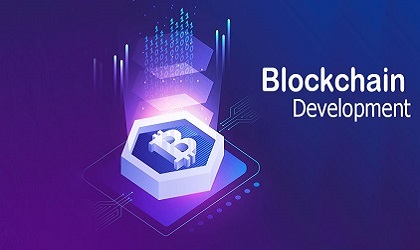As blockchain technology continues to revolutionize industries such as finance, healthcare, supply chain, and more, the demand for skilled blockchain developers has skyrocketed. Whether you’re a beginner looking to enter this innovative field or an experienced developer wanting to enhance your skill set, enrolling in a blockchain development course can open doors to numerous career opportunities. In this article, we’ll explore what a blockchain development course entails, its benefits, and how it can equip you for a successful career in this rapidly growing field.

What is Blockchain Development?
Before diving into the details of a blockchain development course, itâs essential to understand the basics of blockchain technology. Blockchain is a decentralized, distributed ledger system where data is stored in a chain of blocks and is secured by cryptography. The main principles of blockchain include:
- Decentralization: Unlike traditional databases controlled by a central authority, blockchain operates on a peer-to-peer network.
- Immutability: Once data is added to the blockchain, it cannot be altered.
- Transparency: Transactions on a blockchain are visible to all participants in the network.
Blockchain developers work to create and implement decentralized applications (dApps) and smart contracts on platforms like Ethereum, Hyperledger, and others.
Key Topics Covered in a Blockchain Development Course
A blockchain development course provides comprehensive training on both the foundational concepts and practical skills required to build blockchain applications. Here are some of the key topics typically covered:
1. Introduction to Blockchain
- Overview of blockchain technology and its history
- Understanding the structure of blockchain, including blocks, chains, nodes, and ledgers
- Key benefits and challenges of blockchain
2. Cryptography and Security
- Understanding encryption methods and digital signatures
- How public and private keys work
- Role of hashing algorithms in securing data
3. Consensus Mechanisms
- Overview of consensus algorithms like Proof of Work (PoW), Proof of Stake (PoS), and Delegated Proof of Stake (DPoS)
- How these mechanisms ensure the validity of transactions
4. Smart Contracts
- Introduction to smart contracts and their role in automating agreements
- Writing smart contracts using Solidity, the primary programming language for Ethereum
- Deploying and testing smart contracts on blockchain networks
5. Decentralized Applications (dApps)
- Building decentralized applications on platforms like Ethereum
- Integration of smart contracts into dApps
- Understanding how dApps differ from traditional applications
6. Blockchain Platforms
- In-depth exploration of popular blockchain platforms like Ethereum, Hyperledger, and EOS
- Differences between public, private, and consortium blockchains
- Use cases for different blockchain platforms
7. Blockchain Tools and Frameworks
- Familiarization with tools like Truffle, Remix, and Ganache for smart contract development
- Hands-on experience with blockchain testing frameworks and local blockchain environments
Benefits of Taking a Blockchain Development Course
Enrolling in a blockchain development course offers several advantages:
1. High Demand for Blockchain Developers
The demand for blockchain developers is growing as more businesses and industries adopt blockchain technology. Completing a blockchain development course can give you the specialized skills needed to stand out in a competitive job market.
2. Comprehensive Learning
These courses provide structured learning, starting with the basics of blockchain and moving toward advanced concepts like smart contract development and dApp creation. You gain both theoretical knowledge and practical experience.
3. Hands-on Experience
Most blockchain courses include practical projects, allowing you to build real-world blockchain applications. This hands-on experience is invaluable for gaining confidence in your abilities and showcasing your skills to potential employers.
4. Career Opportunities
Blockchain technology is disrupting various industries, including finance, supply chain, healthcare, and real estate. By completing a blockchain development course, you can explore diverse career paths such as blockchain developer, blockchain architect, smart contract developer, and more.
5. Future-Proof Your Career
Blockchain technology is poised for long-term growth, and the skills you acquire today will continue to be in demand for years to come. A blockchain development course helps you stay ahead of the curve and secure your future in a fast-evolving tech landscape.
Choosing the Right Blockchain Development Course
When selecting a blockchain development course, consider the following factors:
1. Course Content
Ensure the course covers a wide range of topics, from blockchain fundamentals to advanced smart contract development and dApp creation. The more comprehensive the course, the better prepared you’ll be for real-world projects.
2. Instructor Expertise
Choose a course taught by experienced instructors with a strong background in blockchain technology. Their insights and real-world experience can significantly enhance your learning experience.
3. Hands-on Projects
Look for courses that offer practical, hands-on projects. Building real blockchain applications as part of your course will give you a deeper understanding of the technology and a portfolio of work to showcase to employers.
4. Certification
Many blockchain development courses offer certification upon completion. Having a recognized certification can be a valuable asset when applying for blockchain development roles.
Conclusion
Blockchain development is a rapidly growing field with immense potential. Enrolling in a blockchain development course equips you with the skills needed to build cutting-edge decentralized applications and smart contracts, opening up numerous career opportunities. Whether you’re new to programming or an experienced developer, mastering blockchain technology can future-proof your career and position you at the forefront of technological innovation.



